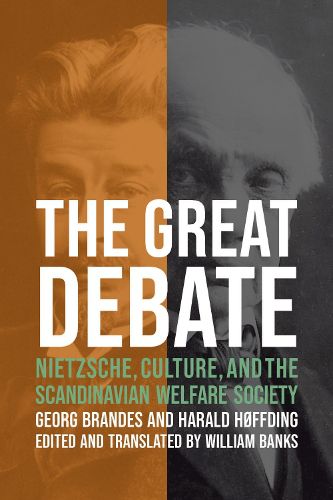Readings Newsletter
Become a Readings Member to make your shopping experience even easier.
Sign in or sign up for free!
You’re not far away from qualifying for FREE standard shipping within Australia
You’ve qualified for FREE standard shipping within Australia
The cart is loading…






This title is printed to order. This book may have been self-published. If so, we cannot guarantee the quality of the content. In the main most books will have gone through the editing process however some may not. We therefore suggest that you be aware of this before ordering this book. If in doubt check either the author or publisher’s details as we are unable to accept any returns unless they are faulty. Please contact us if you have any questions.
In 1889, Danish literary critic Georg Brandes published "Aristocratic Radicalism: An Essay on Friedrich Nietzsche," which transformed the as-yet-unknown German-Swiss philosopher into a European, and ultimately global, phenomenon. The article sparked a furious public debate between Brandes and a fellow Dane, philosopher Harald HOffding, who swiftly issued a rebuttal, "Democratic Radicalism: An Objection." What began as a scholarly disagreement over Nietzsche's philosophy rapidly spiraled into a sprawling contest of competing visions of society's future, one radically aristocratic and the other radically democratic.
Marking the moment at which the uniquely Nordic concept of social democratic welfare was first contested in the public sphere, this debate provides insights into not only Nietzschean philosophy and its immediate reception but also the foundational concept of modern Scandinavian social, cultural, and political organization. This volume presents, for the first time in any language other than Danish, the debate in its entirety: three essays by Brandes and three by HOffding. A critical introduction by editor and translator William Banks explores the exchange in its context and convincingly argues that the principles contested by the two Danish luminaries still very much resonate in Western society today.
$9.00 standard shipping within Australia
FREE standard shipping within Australia for orders over $100.00
Express & International shipping calculated at checkout
This title is printed to order. This book may have been self-published. If so, we cannot guarantee the quality of the content. In the main most books will have gone through the editing process however some may not. We therefore suggest that you be aware of this before ordering this book. If in doubt check either the author or publisher’s details as we are unable to accept any returns unless they are faulty. Please contact us if you have any questions.
In 1889, Danish literary critic Georg Brandes published "Aristocratic Radicalism: An Essay on Friedrich Nietzsche," which transformed the as-yet-unknown German-Swiss philosopher into a European, and ultimately global, phenomenon. The article sparked a furious public debate between Brandes and a fellow Dane, philosopher Harald HOffding, who swiftly issued a rebuttal, "Democratic Radicalism: An Objection." What began as a scholarly disagreement over Nietzsche's philosophy rapidly spiraled into a sprawling contest of competing visions of society's future, one radically aristocratic and the other radically democratic.
Marking the moment at which the uniquely Nordic concept of social democratic welfare was first contested in the public sphere, this debate provides insights into not only Nietzschean philosophy and its immediate reception but also the foundational concept of modern Scandinavian social, cultural, and political organization. This volume presents, for the first time in any language other than Danish, the debate in its entirety: three essays by Brandes and three by HOffding. A critical introduction by editor and translator William Banks explores the exchange in its context and convincingly argues that the principles contested by the two Danish luminaries still very much resonate in Western society today.